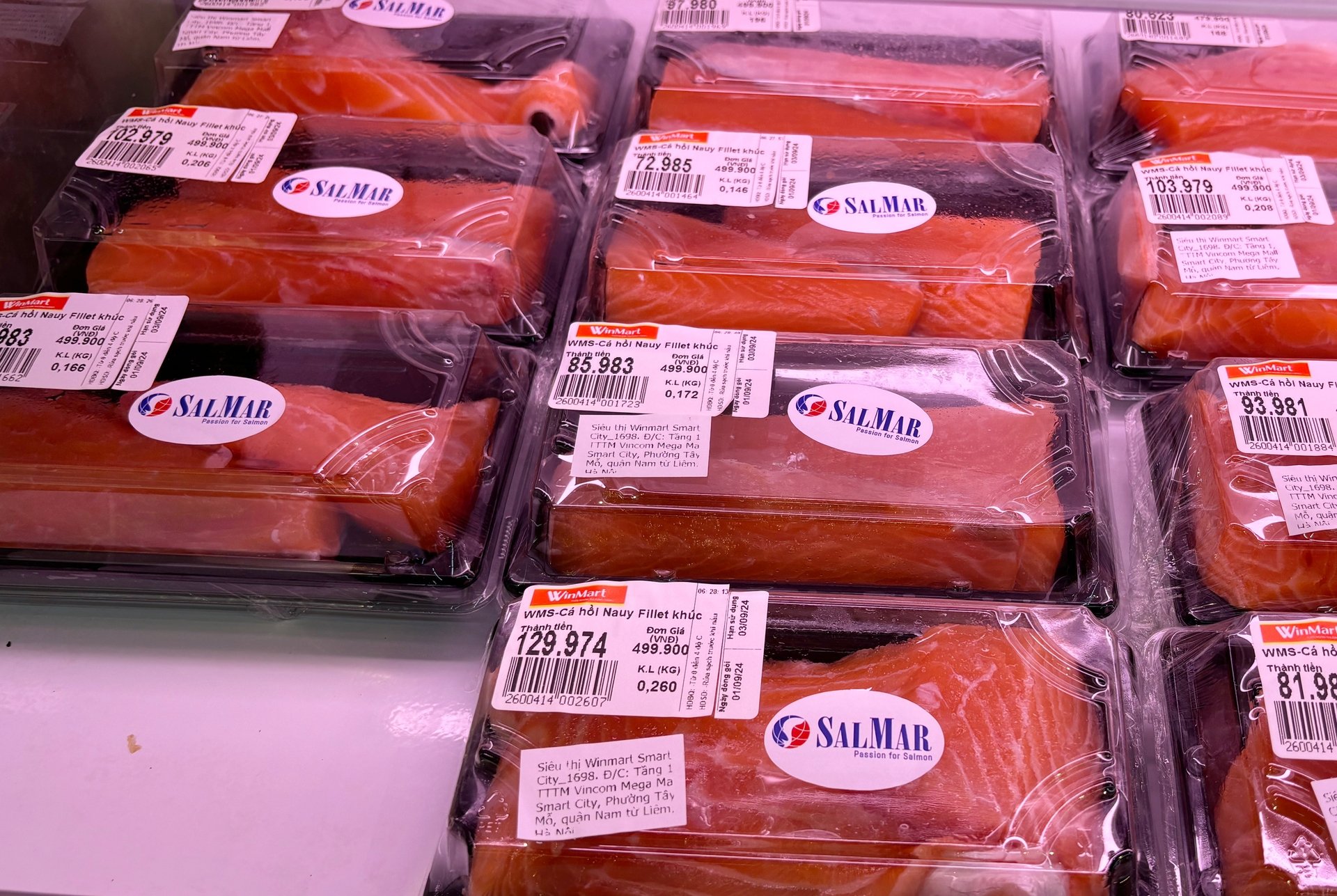December 1, 2025 | 09:46 GMT +7
December 1, 2025 | 09:46 GMT +7
Hotline: 0913.378.918
December 1, 2025 | 09:46 GMT +7
Hotline: 0913.378.918
In an interview with the Vietnam Agriculture and Environment Newspaper, Mr. Christian Valland Sivertsen, Director of SalMar Vietnam, shared practical insights into SalMar's journey toward sustainable development - from applying advanced technology in aquaculture and optimizing the value chain, to building strong connections between producers and consumers in key markets such as Vietnam.

Mr. Christian Valland Sivertsen, Director of SalMar Vietnam said: "All salmon farmers in Norway are obliged to monitor the seabed below their pens to control that the conditions are good and pollution from farming operations are minimal". Photo: HT.
Could you tell us, what technologies is SalMar currently applying in its offshore farms to ensure both their safety and efficiency in the context of harsh ocean conditions and growing marine environmental pollution?
“It is our ambition to not be wasteful in any of our operations, not with the fish and not with our processes and procedures”, Mr. Christian Valland Sivertsen, Director of SalMar Vietnam emphasized.
When we put Ocean Farm 1 into operation in 2017, it was the first offshore fish farm in the world. It combines knowledge from traditional near-coast farming and the Norwegian offshore oil and gas industry, which has been fighting the harsh conditions of the North Sea since the 1970s.
Drawing on experience from large installations in the North Sea ensures that our offshore farm is well-equipped to withstand the forces of the ocean and provide safe conditions for the crew and the fish onboard it.
All salmon farmers in Norway are obliged to monitor the seabed below their pens to ensure good conditions and minimal pollution from farming operations, as per the standards set by the Directorate of Fisheries. The conditions below our farms have been nice and stable even though production has doubled in the last decade.
Can you highlight the key measures/solutions that Salmar has adopted in order to increase product values and optimize the company’s profitability in the global supply chain?
The key to maximising profitability is to ensure that none of your products go to waste. We use the whole fish, and customers have carved out niches for all the various parts—or products—that we make from our salmon.

The Ocean Farm 1 was the first offshore fish farm in the world when we put it into operation in 2017. Photo: HT.
In Vietnam, the main product we sell is premium, big-sized whole fresh salmon, which is mainly consumed as sashimi. However, there is also a significant demand for salmon belly, a by-product resulting from our fillet production in Norway. Heads and bones are used to cook hotpots and soups, and fins can be grilled or deep-fried.
What do you think about SalMar’s strategy to increase its market share and promote the company’s branding visibility in Asia in general and Vietnam in particular?
SalMar is a salmon farming company which has grown to become the second largest producer of Atlantic salmon in the world. Its main farming operations are scattered along the Norwegian coast.
We are proud to say that it has been very successful so far! That said, we are working every day to further increase our market shares and, maybe more importantly, develop the markets we are selling to. If we can help our customers find new niches for our products, we can not only grow our share of the pie but also grow the pie altogether.
I strongly believe Vietnam is a market with great potential for growing the demand for our products.
As for the visibility of our brand, I am always pleased when I see our boxes at the back of motorcycles or in the markets here in Vietnam. I have a whole album full on my phone.
Jokes aside, our visibility is not first and foremost visibility towards the customer in the supermarket or at the restaurant, but rather towards the retailers and restaurants. Together with our customers, we want to be the first choice when they select what fish to put on the menu or on the shelf.
From SalMar’s experiences, what would be the key factors for the success of a sustainable aquaculture industry in such developing countries like Vietnam?
To me, building a sustainable aquaculture industry means forging strong bonds between suppliers and customers, between existing producers and new technologies, all the while consciously using our surroundings.

SalMar salmon products are sold at a supermarket in Hanoi. Photo: HT.
Last year, SalMar announced a $50 million initiative called Salmon Living Lab, which aims to improve salmon farming at large. We invite researchers, suppliers, critics, and others to participate in this effort to improve salmon farming for the fish that swim in our pens.
In SalMar, we believe that everything we do should be on the salmon’s terms. This means that the best produce can only be achieved if our salmon is farmed under optimal conditions, where it can be healthy and strong.
Can you share SalMar’s experiences with human resource training, including technical capacity and technology transfer, with SalMar’s international partners?
An important task for our international branch offices is sharing knowledge about our products and operations. Nothing we enjoy more than showing our customers how salmon farming is done at SalMar. Our doors are always open, and we appreciate it when people make the trip to see our facilities.
In Norway, we even have visitors’ centres near our factories where we invite people from the community to come and learn about our industry and SalMar.
Ocean Farm 1 was a world first when it was launched; later, others followed. Last year, we committed to investing in research to improve fish health. At some of our farms, we have laser beams that shoot sea lice off the salmon’s back.
Technology is becoming an ever-larger part of our operations, and we strive to be at the forefront of the industry to push further advancements and ensure that we can deliver high-quality salmon products to our customers in Vietnam and across the globe.
Sincerely thanks!
Translated by Hong Tham

(VAN) The signing of a protocol between Viet Nam and China on the export of fresh jackfruit represents a significant milestone in agricultural trade cooperation between the two countries.

(VAN) On November 27, the Ninh Binh Department of Agriculture and Environment and the Institute for Green Growth Research organized a training course on greenhouse gas inventory for businesses.

(VAN) China’s cooking oil is suddenly flooding into India. It all comes down to a soybean surplus that Beijing doesn’t quite know what to do with.

(VAN) An Giang promotes supply-demand connections, standardizes quality and builds value chains, creating a foundation for sustainable bird’s nest development and aiming to expand exports.
/2025/11/24/5339-4-nongnghiep-075331.jpg)
(VAN) Recently, the conference on 'Sustainable Fisheries Linkage Chain - Tilapia for Export' took place in Tien Hai commune, Hung Yen province.
/2025/11/21/4309-2-153400_128.jpg)
(VAN) Green and low-emission rice is paving the way for Vietnamese rice to enter high-end markets, marking the beginning of a transformation journey toward greening and elevating the national rice brand.

(VAN) ‘Right to Win’ outlines a national action plan that shapes a new vision for Viet Nam’s agriculture in an era of renewal and global integration.